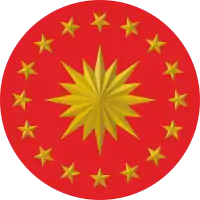Süleyman Demirel
Sami Süleyman Gündoğdu Demirel (Turkish pronunciation: [sylejˈman dem'iɾæl]; 1 November 1924 – 17 June 2015)[1] was a Turkish statesman and political leader who served as the 9th President of Turkey from 1993 to 2000. He previously served as the Prime Minister of Turkey seven times between the years 1965 and 1993. He was the leader of the Justice Party (AP) from 1964 to 1980 and the leader of the True Path Party (DYP) from 1987 to 1993.
Süleyman Demirel | |
|---|---|
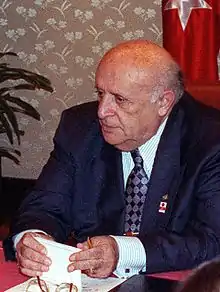 | |
| 9th President of Turkey | |
| In office 16 May 1993 – 16 May 2000 | |
| Prime Minister | Tansu Çiller Necmettin Erbakan Mesut Yılmaz Bülent Ecevit |
| Preceded by | Turgut Özal |
| Succeeded by | Ahmet Necdet Sezer |
| 12th Prime Minister of Turkey | |
| In office 20 November 1991 – 16 May 1993 | |
| President | Turgut Özal |
| Deputy | Erdal İnönü |
| Preceded by | Mesut Yılmaz |
| Succeeded by | Erdal Inönü (acting) |
| In office 12 November 1979 – 12 September 1980 | |
| President | Fahri Korutürk |
| Preceded by | Bülent Ecevit |
| Succeeded by | Turhan Feyzioğlu |
| In office 21 July 1977 – 5 January 1978 | |
| President | Fahri Korutürk |
| Deputy | Necmettin Erbakan Alparslan Türkeş |
| Preceded by | Bülent Ecevit |
| Succeeded by | Bülent Ecevit |
| In office 31 March 1975 – 21 June 1977 | |
| President | Fahri Korutürk |
| Deputy | Necmettin Erbakan Turhan Feyzioğlu Alparslan Türkeş |
| Preceded by | Sadi Irmak |
| Succeeded by | Bülent Ecevit |
| In office 21 October 1965 – 16 March 1971 | |
| President | Cemal Gürsel Cevdet Sunay |
| Preceded by | Suat Hayri Ürgüplü |
| Succeeded by | Nihat Erim |
| Deputy Prime Minister of Turkey | |
| In office 20 February 1965 – 21 October 1965 | |
| Prime Minister | Suat Hayri Ürgüplü |
| Preceded by | Kemal Satır |
| Succeeded by | Atilla Karaosmanoğlu Sadi Koçaş (1971) |
| Leader of the True Path Party | |
| In office 24 September 1987 – 16 May 1993 | |
| Preceded by | Hüsamettin Cindoruk |
| Succeeded by | Tansu Çiller |
| Leader of the Justice Party | |
| In office 28 November 1964 – 16 October 1981 | |
| Preceded by | Ragıp Gümüşpala |
| Succeeded by | Party abolished |
| Member of the Grand National Assembly | |
| In office 29 November 1987 – 16 May 1993 | |
| Constituency | Isparta (1987, 1991) |
| In office 10 October 1965 – 12 September 1980 | |
| Constituency | Isparta (1965, 1969, 1973, 1977) |
| Personal details | |
| Born | Süleyman Gündoğdu Demirel 1 November 1924 Atabey, Turkey |
| Died | 17 June 2015 (aged 90) Ankara, Turkey |
| Cause of death | Respiratory failure |
| Resting place | Atabey, Turkey |
| Nationality | Turkish |
| Political party | Justice Party, True Path Party (now Democratic Party) |
| Spouse(s) | |
| Alma mater | Istanbul Technical University |
| Profession | Civil engineer |
| Signature | |
Having been identified as a potential future Prime Minister by Adnan Menderes, Demirel was elected leader of the Justice Party in 1964 and managed to bring down the government of İsmet İnönü in 1965 despite not being a Member of Parliament. He supported the government of Suat Hayri Ürgüplü until his party won a parliamentary majority in the 1965 general election. Claiming that his grouping was the successor of the banned Democrat Party, he was re-elected as Prime Minister in 1969 by winning a parliamentary majority for a second time. Despite his economic reforms which stabilised inflation, he resigned as Prime Minister after his budget was blocked by parliament, but formed his third government shortly after. His premiership came to an end following the 1971 Turkish coup d'état.
Demirel was the leader of the opposition from 1971 to 1975 before forming a four-party government known as the First Nationalist Front, which collapsed in 1977. With two other parties, he formed the Second Nationalist Front cabinet in 1977, which collapsed in 1978. Demirel's minority government in 1979 was unable to elect a president in 1980, leading to the 1980 Turkish coup d'état which banned Demirel from politics. In the 1987 constitutional referendum, Demirel regained the right to actively participate in politics and assumed the leadership of the True Path Party. He won the 1991 general election and formed a coalition with the Social Democratic Populist Party (SHP), assuming his fifth and final term as Prime Minister. Following the sudden death of serving President Turgut Özal, Demirel contested the 1993 presidential election and subsequently became the ninth President of Turkey until 2000. With 10 years and 5 months, Demirel's tenure in the prime ministership is the third longest in Turkish history, after İsmet İnönü and Recep Tayyip Erdoğan.
Background and early career
Demirel was born on 1 November 1924, in Atabey, a town in Isparta Province. Upon completion of his elementary school education in his hometown, he attended middle school and high school in Isparta and Afyon, respectively. He graduated from the school of civil engineering at the Istanbul Technical University in 1949.[2]
Demirel worked in the state department for electrical power planning in 1949. He undertook postgraduate studies on irrigation, electrical technologies and dam construction in the United States, first in 1949–1950, then in 1954–1955. During the construction of the Seyhan Dam, Demirel worked as a project engineer and in 1954 was appointed Head of the Department of Dams. As of 1955, he served as Director General of the State Hydraulic Works (DSİ). As such, Demirel supervised the construction of a various power plants, dams and irrigation facilities.[2] Eisenhower Fellowships selected Suleyman Demirel in 1954 to represent Turkey.[3]
After the 1960 coup d'état, he was drafted to the Turkish Army for compulsory military service.[2] Upon completion of his military service, he worked as a freelance engineer and a representative of Morrison Construction, a U.S. company. During this period, he also worked as a part-time lecturer of hydraulic engineering at the Middle East Technical University (ODTÜ) in Ankara.[4]
Political career
His political career started with his election to the executive board of the Justice Party,[4] founded by the former General Ragıp Gümüşpala under directions from Head of State Cemal Gürsel, as a replacement of the Democrat Party that folded after the military coup of 27 May 1960. Journalist and MP Cihat Baban claims in The Gallery of Politics (Politika Galerisi), that Cemal Gürsel told him:
We may solve all troubles if Süleyman Demirel can become the head of the Justice Party (Adalet Partisi). I am working very hard for him to become the party leader. If I succeed in this, I will be happy.[5]
With his Turkish with a rural, central Anatolian accent and the fact that he came from a village from the countryside, he was able to capture the masses which where often present at the campaign rallies he held and present himself as one of theirs.[6]
1960s and 70s

On 22 March 1963, the imprisoned former President Celal Bayar was released on parole, causing protests in front of Justice Party headquarters. Demirel, who was on the executive board of Justice Party, then resigned from his position, claiming that "There wouldn't be democracy in this country [Turkey] for another 50 years". He remained inactive until the death of Ragıp Gümüşpala, when, in June 1964, he re-entered politics as a candidate for chairman of the Party. However, Demirel faced strong opposition. His biggest rival was Sadettin Bilgiç, nicknamed "koca reis" ("big captain" in English). Bilgiç supporters accused Demirel of being a freemason; however, Demirel averted the crisis with a clever stratagem. Instead of writing to his own lodge, Demirel petitioned a separate freemason's lodge asking whether he was a member or not. As expected, the lodge chairman answered negatively. This turned the tide in Demirel's favor, and he received enough votes to become the Chairman of the Party.[2]
Demirel was elected chairman at the second grand party convention on 28 November 1964. He facilitated the formation of a caretaker government that ruled between February and October 1965 under the premiership of Suat Hayri Ürgüplü, in which he served as Deputy Prime Minister. Under his leadership, the AP won an unprecedented majority of the votes in the 1965 general election and formed a majority government. Demirel thus became the youngest-ever Prime Minister in Turkish history at the age of 40.[7]
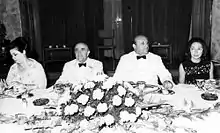
As deputy from Isparta, Demirel became Turkey's 14th Prime Minister. In the next elections on 10 October 1969, his party was the sole winner by a landslide once again. Demirel presided over the laying the foundations of the Keban Dam, the Bosphorus Bridge and an oil pipeline between Batman and İskenderun. Despite his economic reforms which stabilised inflation, he resigned as Prime Minister after his budget was blocked by parliament, but formed his third government shortly after. He resigned after the military memorandum of 12 March 1971, which had been caused by a disagreement between the government and military over the Cyprus dispute, an escalation of tensions with Greece and growing political violence. He was also accused of deviating from the principles of Mustafa Kemal Atatürk, which he denied.
Demirel was the leader of the opposition from 1971 to March 1975 before forming a four-party government known as the first nationalist front, which collapsed in June 1977. He formed the second nationalist front cabinet in July 1977 with two other parties (MSP and MHP), which collapsed in January 1978. A rise in global petrol prices contributed to a surge in inflation and an economic crisis and Demirel's government responded with economic liberalisation, though these reforms were rejected by other parties. This led to a spate of political violence and strikes, during which 42 people were killed in the 1977 Taksim Square massacre. Demirel's minority government in 1979 was unable to elect a president in 1980, leading to the coup d'état in September 1980 which banned Demirel from politics.[8]
1980s

Following the coup d'état of 12 September 1980, headed by Kenan Evren, he was banned from involvement in active politics for ten years. In 1986, however, Demirel launched a national campaign for the lifting of the ban and initiated a national referendum on the issue.[9]
The 1987 constitutional referendum allowed him to return to active politics. Only 18 days later, Demirel was elected chairman at the extraordinary convention of the True Path Party (DYP), a replacement for the Justice Party. He was re-elected Deputy of Isparta at the elections of 29 November 1987.[9]
1990s and 2000s
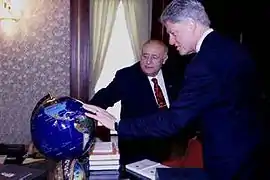
Following the 1991 general election, Demirel became Prime Minister once again in a coalition government with the Social Democratic Populist Party. After the sudden death of President Turgut Özal, he became the ninth President on 16 May 1993, elected by the Grand National Assembly of Turkey. He served as President until 16 May 2000 for the constitutional term of seven years. His overall tenure as Prime Minister was shorter than only Ismet Inönü's and Recep Tayyip Erdogan's.
Later life and Death
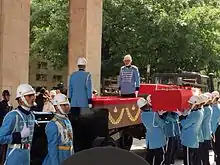
Following retirement from politics, Demirel was frequently a panelist and speaker at several places mostly in universities within Turkey. He died on 17 June 2015 at the Guven hospital in Ankara where he had been undergoing treatment for a respiratory tract infection. He was buried few days later in Atabey.[10]
Legacy
The Süleyman Demirel Airport and Süleyman Demirel University, both of which are in Isparta are named after him. So are the Süleyman Demirel Stadium in Antalya, the Süleyman Demirel Medical Centre of the Atatürk University in Erzurum and Suleyman Demirel University in Kazakhstan. There are also two important main streets named after him: one in Istanbul and the other in Muğla. On 26 October 2014 Süleyman Demirel Democracy and Development Museum was opened in Isparta.[11]
Awards
Demirel was awarded with the Istiglal Order for his contributions to development of Azerbaijan–Turkey relations, his constructive position on the Nagorno-Karabakh conflict, and his support for unity among Turkic states by President of Azerbaijan Heydar Aliyev on 12 June 1999.[12] He is also a Collar of the Estonian Order of the Cross of Terra Mariana, a recipient of the Polish Order of the White Eagle (1993), Order of the Golden Fleece (Georgia) and a Knight Grand Cross of the Croatian Grand Order of King Tomislav.[13]
In popular culture
Demirel was often nicknamed Baba (The Father) or Çoban Sülü (The Shepherd Sülü (Süleyman)) and humorously Spartacus, after his native city of Isparta. His fedora hat was a famous part of his image.[14][15]
Although Demirel had retired, whenever there was political distress, Turkish media or his followers (humorously or otherwise) called on him with the words "Kurtar bizi baba" ("Father, save us"). He is well known for uttering phrases such as "Dün dündür, bugün bugündür" ("Yesterday is yesterday, today is today"), usually said when he has changed his stand on a subject. Another example is "Benzin vardı da biz mi içtik?" ("Did we drink the gasoline, as if there were any?"), said when defending his actions during the 1970s energy crisis.[16] When the question of criminalizing sex work came to question by the increased popularity of conservative movements, he responded "Genelevleri kapatalım da millet bizi mi siksin?" ("Should we close the brothels so people can fuck us?").[17]
References
- Sarı, Eren (25 December 2016). "Çoban Sülü: Türk siyasetinin son 50 yılına fötr şapkası ve renkli kişiliğinin yanı sıra, hiç çocuğu olmadığı halde 'Baba' lakabıyla damga vuran 9. Cumhurbaşkanı Süleyman Demirel, "Akşam olunca kapısını kilitlemeden yatabilen, sabaha karşı kapıyı çalanların polis olmadığını düşünen bir Türkiye" hayaliyle aramızdan ayrıldı". Noktaekitap. Retrieved 6 December 2018 – via Google Books.
- Arslanbenzer, Hakan (19 June 2015). "Süleyman Demirel: Dream for a 'Great Turkey'". Daily Sabah. Retrieved 20 June 2015.
- Kinzer, Stephen (16 June 2015). "Suleyman Demirel, Seven Times Turkey's Prime Minister, Dies at 90". The New York Times. Retrieved 20 June 2015.
- "Süleyman DEMİREL". Turkish Ministry of Foreign Affairs. Archived from the original on 25 March 2014. Retrieved 20 June 2015.
- Baban, Cihad (2009). Politika galerisi (in Turkish). Istanbul: Timaş. ISBN 9752639666.
- Heper, Metin; Landau, Jacob M. (1991). Political Parties and Democracy in Turkey. I.B. Tauris. pp. 189–191. ISBN 1-85043-300-3.
- Akkoc, Raziye (17 June 2015). "Suleyman Demirel, former Turkish president, dies at 90". The Daily Telegraph. Retrieved 20 June 2015.
- Barchard, David (17 June 2015). "Süleyman Demirel obituary". theguardian.com. Retrieved 20 June 2015.
- "Archived copy". Archived from the original on 12 September 2017. Retrieved 12 September 2017.CS1 maint: archived copy as title (link)
- "Turkey's ninth president Suleyman Demirel passes away". Anadolu Agency. 17 June 2015. Retrieved 20 June 2015.
- "Sleyman Demirel Demokrasi ve Kalknma Mzesi ald". Radikal (in Turkish).
- "Türkiyə Cümhuriyyətinin Prezidenti Süleyman Dəmirəlin "İstiqlal" ordeni ilə təltif edilməsi haqqında haqqında AZƏRBAYCAN RESPUBLİKASI PREZİDENTİNİN FƏRMANI" [Order of the President of Azerbaijan Republic on awarding President of Turkey Suleyman Demiral with Istiglal Order] (in Turkish). Archived from the original on 15 March 2012. Retrieved 20 January 2011.
- "Untitled Document". Royalcroatia.tripod.com. Retrieved 6 December 2018.
- Anadolu Agency. "Turkey's 9th President Suleyman Demirel dies at 91". Getty Images.
- "HATS: A POLITICAL SYMBOL OF TURKISH HISTORY". Ekrembugraekinci.com. Retrieved 27 November 2017.
- https://www.milliyet.com.tr/milliyet-tv/suleyman-demirel-benzin-vardi-da-biz-mi-ictik-video-4597335
- https://www.mynet.com/asla-unutulmayacak-sozleri-ve-kararlari-ile-suleyman-demirel-190101055689
External links
| Wikimedia Commons has media related to Süleyman Demirel. |
| Party political offices | ||
|---|---|---|
| Preceded by Ragıp Gümüşpala |
Leader of the Justice Party 1964–1980 |
Position abolished |
| Preceded by Hüsamettin Cindoruk |
Leader of the True Path Party 1987–1993 |
Succeeded by Tansu Çiller |
| Political offices | ||
| Preceded by Kemal Satır |
Deputy Prime Minister of Turkey 1965 |
Succeeded by Sadi Koçaş |
| Succeeded by Atilla Karaosmanoğlu | ||
| Preceded by Suad Hayri Ürgüplü |
Prime Minister of Turkey 1965–1971 |
Succeeded by Nihat Erim |
| Preceded by Sadi Irmak |
Prime Minister of Turkey 1975–1977 |
Succeeded by Bülent Ecevit |
| Preceded by Bülent Ecevit |
Prime Minister of Turkey 1977–1978 |
Succeeded by Bülent Ecevit |
| Preceded by Bülent Ecevit |
Prime Minister of Turkey 1979–1980 |
Succeeded by Bülend Ulusu |
| Preceded by Mesut Yılmaz |
Prime Minister of Turkey 1991–1993 |
Succeeded by Tansu Çiller |
| Preceded by Turgut Özal |
President of Turkey 1993–2000 |
Succeeded by Ahmet Necdet Sezer |
